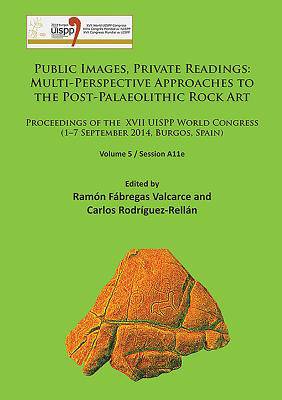
- Afhalen na 1 uur in een winkel met voorraad
- Gratis thuislevering in België vanaf € 30
- Ruim aanbod met 7 miljoen producten
- Afhalen na 1 uur in een winkel met voorraad
- Gratis thuislevering in België vanaf € 30
- Ruim aanbod met 7 miljoen producten
Zoeken
Public Images, Private Readings
Multi-Perspective Approaches to the Post-Palaeolithic Rock Art: Proceedings of the XVII Uispp World Congress (1-7 September 2014, Burgos, Spain) Volume 5 / Session A11e
Paperback | Engels | Proceedings of the XVII UISPP World Congress (1–7 September 2014, Burgos, Spain)
€ 29,95
+ 59 punten
Omschrijving
A significant number of Holocene societies throughout the world have resorted at one time or another to the making of paints or carvings on different places (tombs, rock-shelters or caves, openair outcrops). The aim of the session A11e. Public images, private readings: multi-perspective approaches to the post-Palaeolithic rock art, which was held within the XVII World UISPP Congress (Burgos, September 1-7 2014), was to put together the experiences of specialists from different areas of the Iberian Peninsula and the World. The approaches ranged from the archaeological definition of the artistic phenomena and their socioeconomic background to those concerning themselves with the symbolic and ritual nature of those practices, including the definition of the audience to which the graphic manifestations were addressed and the potential role of the latter in the making up of social identities and the enforcement of territorial claims. More empirical issues, such as new recording methodologies and data management or even dating were also considered during this session.
Specificaties
Betrokkenen
- Uitgeverij:
Inhoud
- Aantal bladzijden:
- 76
- Taal:
- Engels
- Reeks:
Eigenschappen
- Productcode (EAN):
- 9781784912895
- Verschijningsdatum:
- 30/04/2016
- Uitvoering:
- Paperback
- Formaat:
- Trade paperback (VS)
- Afmetingen:
- 203 mm x 290 mm
- Gewicht:
- 321 g

Alleen bij Standaard Boekhandel
+ 59 punten op je klantenkaart van Standaard Boekhandel
Beoordelingen
We publiceren alleen reviews die voldoen aan de voorwaarden voor reviews. Bekijk onze voorwaarden voor reviews.










